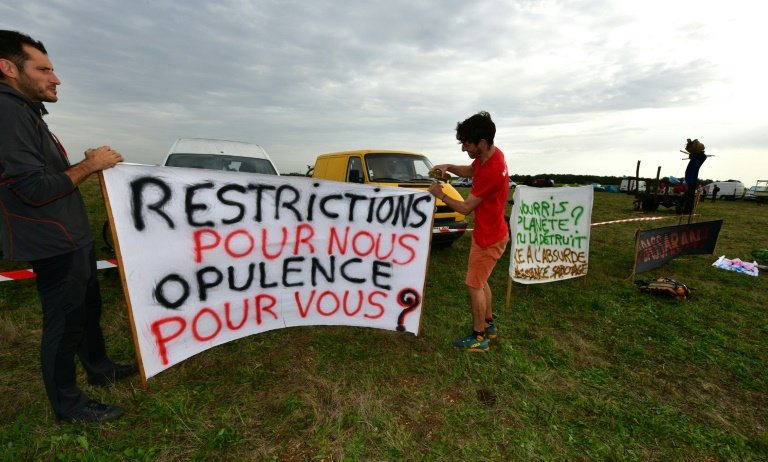The historic drought strengthens them in their resistance: several thousand demonstrators are preparing on Saturday to try to counter the ban on the Deux-Sèvres prefecture and an impressive gendarmerie device to reach the construction site of a water reserve that they intend to “restore” .
“Sainte-Soline is 720,000 cubic meters of water over more than 10 hectares, 18 kilometers of pipes for farmers, not one of whom has given up pesticides. We don’t want it to happen here, we don’t want it to be done anywhere else,” said Melissa Gingreau, spokesman for the “Bassines Non Merci” collective on Saturday, which brings together environmental associations, unions and anti-capitalist groups.
Thousands of protesters, most of whom arrived on foot to bypass traffic restrictions, gathered at noon on Saturday in a field lent by a farmer, littered with barnums and a yellow tent emblazoned with the words “Corn for All, Zero Justice Goes.”
The prefect of Deux-Sèvres Emmanuelle Dubée said on Saturday that she feared “a violent demonstration” and recalled that it was “forbidden” because of the injuries and clashes that marked a previous demonstration in March.
“We will not allow a protest procession or groups of individuals to approach the site of the replacement reserve”, she added. Around 1,500 gendarmes have been mobilized and at least two helicopters are crossing the area.
“Today it will be fine, the police have no choice but to back off and we have to dance in this crater”, assures Julien Le Guet, another spokesman for “Basins No Thanks”.
– 260 Olympic swimming pools –
Surrogate reserves are open craters covered with plastic and filled by pumping water from surface groundwater in winter. They can store up to 650,000 m3 (ie 260 Olympic swimming pools) of water for irrigation in the summer when there is less rainfall.
That of Sainte-Soline is the second of a project of 16 developed by a group of 400 farmers gathered in the Coop de l’eau, to “reduce water withdrawals by 70%”, in this region still subject to irrigation restrictions after an extraordinary summer drought.
“It’s October 29, it’s dry everywhere, it’s absurd to monopolize all the water available to a few corn farmers”, condemned MEP Yannick Jadot, present at the scene like other elected environmentalists, including MP Sandrine Rousseau.
The minister for ecological transition, Christophe Béchu, said he agreed with opponents on “the need for us to jointly reduce (…) our water consumption”, but stressed in France that “the project had no negative consequences for groundwater , according to a recent report.
According to this study by the Bureau of Geological and Mining Research (BRGM), compared to the period 2000-2011, the project could increase “by 5% to 6%” the flow of rivers in summer, against a decrease of 1% in winter without taking into account for the potential evaporation of future reserves or the threat of recurrent drought associated with global warming.
Mr. Béchu also recalled that “the plan signed by everyone four years ago” after long consultations between farmers, elected officials, authorities and associations made access to water conditional on changes in practice (reduction of pesticides, planting of hedges, conversion to agroecology). ).
But none of the ten farmers using the first deduction “have subscribed to a reduction of pesticides”, according to Vincent Bretagnolle, member of the project’s scientific and technical monitoring committee (CST), and since the signing several associations have withdrawn from the protocol ..
Denis Mousseau, president of FNSEA 79, which defends this storage project, reminded AFP on Thursday of the “strong concern” of local farmers about this gathering.
“We are not fighting farmers, we are fighting the tools of the agro-industry which are making farmers disappear,” said Nicolas Girod, spokesman for the Confédération paysanne. “In 30 years, the number of farmers has been divided by three”.
.
